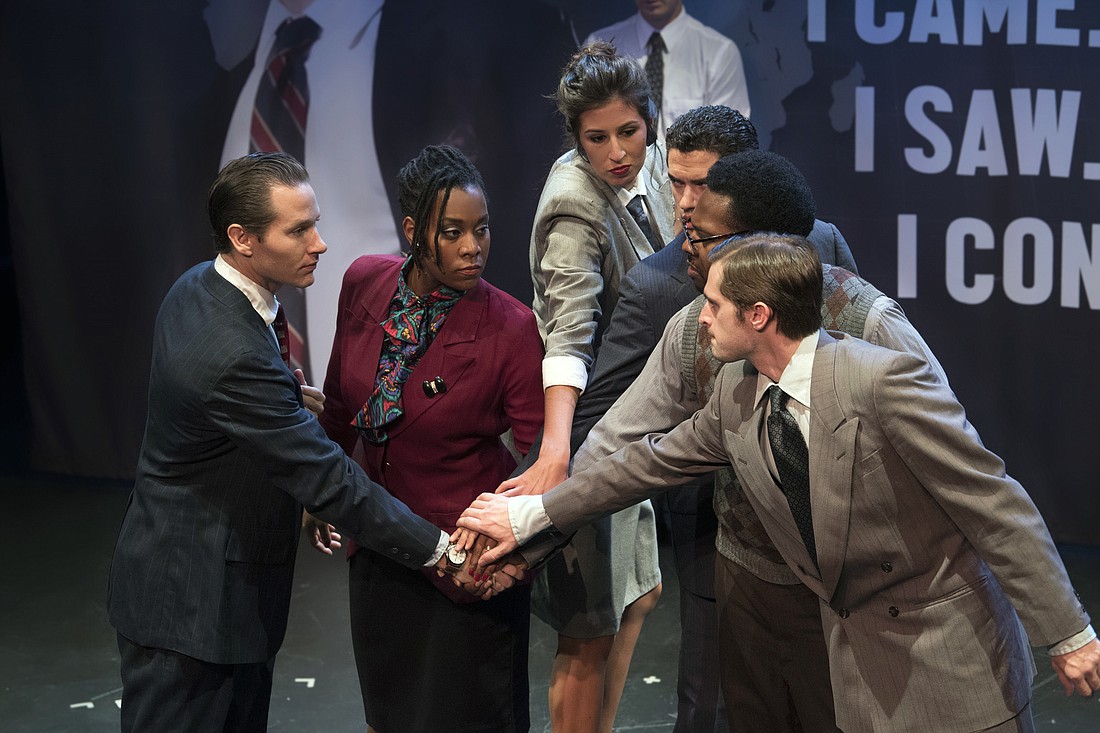- November 25, 2024
-
-
Loading

Loading

The Asolo Conservatory’s latest touring production recently began the first leg of a “Julius Caesar Tour,” which sounds ominous if you have ancestors in Gaul. Actually, that tour will take Tyler Dobrowsky’s 45-minute distillation of the bard’s 125-minute tragedy to schools and performing arts venues across Florida.
This adaptation replaces togas with power suits, and retools Rome as Wall Street in the greed-is-good 1980s. Julius Caesar becomes an ambitious Gordon Gekko type who thinks too much is never enough. But his impending hostile takeover creates workplace stress. In an off-the-books meeting, his colleagues decide to cut it short. Spoiler alert: They all stab him to death. Caesar dies.
Poor guy. It won’t be the last time. Because this show is hitting the road.
Like a bloody déjà vu, his assassination will repeat across the Sunshine State. And they say the valiant die but once.
Here’s my take, based on opening night:
Dobrowsky gets high marks for his educational condensation of the source material. Shakespeare is tough to cut. Any cut will be unkind. But you still have to get out the knives, and try to find one clear narrative line. Clarity is everything, especially when you’re reaching out to students with short attention spans. Dobrowksy wisely focuses on Brutus’ moral conflict. Brutus is probably the play’s most interesting character — a good man who stabs his friend in the heart for all the right reasons and then eats his heart out. It’s a powerful thread in the play, and a good choice for the adaptation. One misstep: The assassination happens almost immediately and the motive behind it isn’t well established. (Once upon a time, the Roman republic became an empire. Students blissfully unaware of this fact won’t know what’s at stake.) For a quick fix, make “The Cult of Personality” the opening song, and have Brutus do a long, slow, silent burn at mob’s mindless adulation of Caesar. Make it clear this is the moment he makes up his mind to assassinate his friend. That would do it.
James Dean Palmer draws on the clarity of Dobrowsky’s adapted script, which is essentially a Shakespearean highlights reel. Basically, the action sets up the big speeches. A thread of story ties the speeches together. Palmer keeps the story clear.
Evoking a sharply dressed decade of materialistic greed is the assignment. Dominique Fawn Hill’s padded shoulders and narrow ties do the job.
Myah Shein’s fight choreography is sharp. She manages to evoke a massive battle with a handful of actors on a tiny stage. Kudos.
Andrew Bosworth’s Julius Caesar is a lean, mean bantam rooster ascending to the top of the pecking order. He knows he’s destined for the top; there’s not a spot of self-doubt in his mind. Anthony J. Hamilton’s Brutus is nuanced and heartbreaking. He conveys the agony of a mind in torment, and you can tell his mind is always working. Aleksander Krapivkin’s Marc Anthony is cagy, shifty and smart. His character’s a good guy in the play. If you didn’t know that, you might think he’s a clever demagogue who knows exactly what to say to stir up a bloody mob.
This adaptation could’ve easily been a Caesar salad. But it’s as vivid as the barely remembered fragments of a fever dream. It’s not the whole dream, of course. Shakespeare’s nightmares were far greater. Hopefully, the students who taste this sampler will hunger for the whole feast.